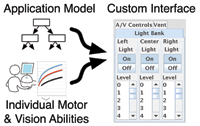 Most of today's GUIs are designed for the typical, able-bodied user.
People with unusual abilities (due to a disability, a temporary injury, or who are just trying to operate a small device with cold fingers) have to adapt themselves to the user interfaces, perhaps using assistive technologies.
We are working to reverse this situation: we believe that user interfaces should be adapted to the invidual abilities, devices, and preferences of the people who use them.
Most of today's GUIs are designed for the typical, able-bodied user.
People with unusual abilities (due to a disability, a temporary injury, or who are just trying to operate a small device with cold fingers) have to adapt themselves to the user interfaces, perhaps using assistive technologies.
We are working to reverse this situation: we believe that user interfaces should be adapted to the invidual abilities, devices, and preferences of the people who use them.
Several invidual projects in our group contribute to this vision. Our work on the SUPPLE system, for example, demonstrated that we can automatically generate user interfaces adapted to a person's individual motor and vision abilities. The results of our studies showed that people with motor impairments were significantly faster and strongly preferred such automatically generated ability-based interfaces to the defaults provided by the software manufacturers.
Papers, video, and other resources are available on the project web site.
 Most of today's GUIs are designed for the typical, able-bodied user.
People with unusual abilities (due to a disability, a temporary injury, or who are just trying to operate a small device with cold fingers) have to adapt themselves to the user interfaces, perhaps using assistive technologies.
We are working to reverse this situation: we believe that user interfaces should be adapted to the invidual abilities, devices, and preferences of the people who use them.
Most of today's GUIs are designed for the typical, able-bodied user.
People with unusual abilities (due to a disability, a temporary injury, or who are just trying to operate a small device with cold fingers) have to adapt themselves to the user interfaces, perhaps using assistive technologies.
We are working to reverse this situation: we believe that user interfaces should be adapted to the invidual abilities, devices, and preferences of the people who use them.